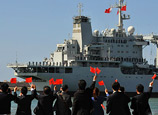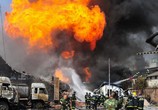
BOSTON, United States, April 13 (Xinhua) -- Talent and credibility were two of the main challenges facing Chinese firms in their bid to merge with overseas companies, an expert in the field told the Harvard China Forum here.
Shau Zhang, partner of Ernst & Young's Americas Tax Leader of China Overseas Investment, said Saturday Chinese firms should learn from their peers in developed economies, hone their technology know-how and get ready to spend a long time accumulating knowledge.
Zhang, who worked on Dalian Wanda's milestone acquisition of AMC Entertainment Inc. in 2012, said, to achieve better results in overseas mergers, Chinese companies needed to learn from senior management of prestigious global players and use their experiences to optimize solutions that suited their own realities.
Chinese companies, which were often viewed as newly rich with ample cash to scatter in their various overseas takeover bids, should also make efforts to build a good image overseas, as their U.S competitors had done, and try to integrate themselves into local society, she said.
Regarding the relationship between Chinese firms and the merged foreign companies, Zhang compared the process of credibility-building as "dating," saying it took time for the two sides to know and trust each other.
Zhang said Chinese firms were accelerating the pace of merger activities around the world, especially in the field of shale gas, including Sinochem Group's 1.7-billion-dollar shale gas deal with oil and gas producer Pioneer Natural Resources in February and a 2.2 billion dollar deal between a Sinopec subsidiary and Oklahoma-headquartered Devon Energy Corporation early last year.
However, she warned technology mergers were very sensitive, especially shale gas technology.
In order to transform itself into a technology power from a manufacturing and consumption power, China had to spend a longer time on research and development. "Acquired technology is absolutely a different concept from technology gained through research and development," Zhang said.
Compared with the leading global corporations, Chinese companies still had room to improve to become fully able to weather global economic and political risks, Zhang said.
"But as long as they have a good strategy to enlarge their global market shares, train talent and do a benchmark study of successful companies in their respective field, it is just a matter of time before they become truly globalized firms," she said.
















 Photo story: A family infected by HIV
Photo story: A family infected by HIV


![]()
